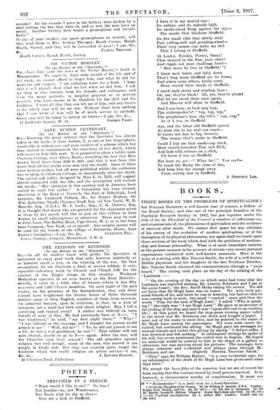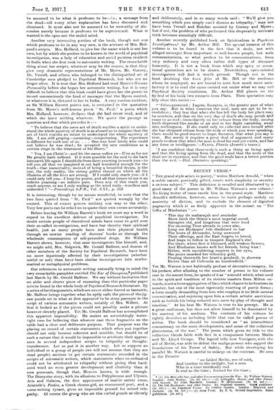B 0 0 K S .
THREE BOOKS ON THE PROBLEMS OF SPIRITUALISM.t Sin Wricerair Butnsrrr, a well-known man of science, a Follow of the Royal Society, and also one of the principal founders of the Psychical Research Society in 1882, has put together under the title of On the Threshold of the Unseen' a number of reflections on, and examinations of, the phenomena of spiritualism and the evidence of survival after death. We cannot find space for any criticism of his survey of the evolution of modern spiritualism, or of his description of its physical phenomena, nor again shall we touch upon those sections of the book which deal with the problems of medium- ship and human personality. What is of most immediate interest
at the present moment is his account of certain very recent personal experiments conducted with well-known amateurs. Hero is the story of a sitting with Mrs. Travers Smith, the wife of a well-known Dublin physician and the daughter of the late Professor Don-den.
Mrs. Travers Smith obtained the communication through a "ouija board." The sitting took place on the day of the sinking of the Lusitania ' :- "' On tho evening of the day on which news had come that the Lusitania was reported sinking, Mr. Lennox Robinson and I sat at the ouija board ; the Rev. Savill Hicks taking the record. We did not know that Sir Hugh Lane was on board. We were both per- sonal friends of his, and knew he was in America, but had no idea he was coming back so soon. Our usual " control " came and then the words " Pray for the soul of Hugh Lane." I asked "Who is speak- ing ?" the reply was " I am Hugh Lane." He gave us an account of the sinking of the ship and said it was "a peaceful end to an exciting life." At this point wo heard the atop.pross evening paper called in the street and Mr. Robinson ran down and bought a papei. I went out of the room to meet him, and he pointed to the name of Sir Hugh Lane among the passengers. We wore both much dis- turbed, but continued the sitting. Sir Hugh gave me messages for mutual friends and ended this sitting by saying " I did not suffer, I was drowned and felt nothing." At subsequent sittings he spoke of his will, but never mentioned the codicil now in dispute. He hoped no memorial would be erected to him in the shape of a gallery or otherwise, but was anxious about his pictures. The messages were always coherent and evidential and always came through Mr. Robinson and me. (Signed) HESTER TRAVERS SMITH.'
"This," says Sir William Barrett, "is a very evidential case, for no information of the death of Sir Hugh Lane was given until some days later."
We accept the bona fides of the reporter, but we are of course far• from saying that this curious record by itself proves survival. It is, however, a circumstance worthy of consideration. It must not gio • " Nickeeneeker" is a local term for a hand-filecutter.
t (1) On the Threshold of the Unseen. By Sir William P. Barrett, F.R.S. London : Regan Paul, Trench, and Co. Os. ed. net.]--(2) The Ear of Dionysius. By the Rt. lionble. Gerald W. Balfour. Glasgow : James MacLehose and Sons. [IL ed. net.] —43) Psychical Investigations. By J. Arthur Bill. Loudon: Cassell and Co._ AI. net.) be assumed to he what it professes to be—i.e., a message from the dead—till every other explanation has boo.i discussed and dismissed. It must also not be assumed to be unworthy of dis- cussion merely because it professes to be supernormal. What is wanted is the open not the sealed mind.
Another very interesting portion of the book, though not one which professes to be in any way new, is the account of Mrs. Hol- land's scripts. Mrs. Holland, to give her the name which is not her own, but by which she prefers to be known in the world of psychical investigation, was a lady of education and social position resident in India whoa she first took to automatic writing. Tho remarkable thing about her scripts, whatever may be the reason, is that they give very dramatic reproaentations of Mr. Myers, Mr. Gurney, Dr. Yemen, and others who belonged to the distinguished set of Cambridge men pledged to Psychical Research, but who are no longer alive. It is true that Mrs. Holland had read Myers's Human Personality before she began her automatic writing, but it is very difficult to believe that this book could have given her the power to invent unconsciously the kind of messages that the Myers control, or whatever it is, dictated to her in India. A very curious incident, as Sir William Barrett points out, is contained in the quotation from Mr. Myers's well-known poem " St. Paul," a poem which Mrs. Holland, however, declare.; that she had never read, and of which she knew nothing whatever. We quote the passage in question and that which precedes it :— " To believe that the mere act of death enables a spirit to under- stand the whole mystery of death is as absurd as to imagine that the act of birth enables an infant to understand the whole mystery of life. I am still groping—surmising—conjecturing. The experience is different for each ono of us. . . . One was here lately who could not believe he was dead ; he accepted the new conditions as a certain stage in the treatment of his illness."
" Yea, I am Christ's—and let the name suffice ye—E'en as for me He greatly hath sufficed. If it were possible for the soul to die back into earth life again I should die from sheer yearning to reach you—to toll you all that we imagined is not half wonderful enough for the truth—that immortality, instead of being a beautiful dream, is the one, the only reality, the strong golden thread on which all the illusions of all tho lives are strung. If I could only reach you—if I could only tell you—I long for power, and all that comes to me is an infinite yearning—an infinite pain. Does any of this reach you, reach anyone, or fun I only wailing as the wind wails—wordless and
unheeded 1 "—Proceedings S.P.R., Vol. p. 233.
It is interesting, though by no means wonderful, to note that the two lines qttoted from " St. Paul " are quoted wrongly by the control. This of course proves nothing one way or the other. Very few poets can be relied on to quote their own verses accurately.
Before leaving Sir William Barrett's book we must say a word in regard to his excellent defence of psychical investigation. No doubt certain people of disordered minds have come to grief over their so-called investigations, and have lost thereby their spiritual " health, just as many people have lost their physical health through an unwise reading of doctors' books or through the wholesale consumption of self-prescribed drugs. Sir William Barrett shows, however, that sane investigators like himself, and, we might add, Mrs. Sidgwiek, Mr. Gerald Balfour, and dozens of other members of the Society for Psychical Research, have been no more injuriously affected by their investigations (whether useful or not) than have been similar investigators into mathe- matical or metaphysical problems.
Our references to automatic writing naturally bring to mind the very remarkable pamphlet entitled The Ear of Dionysius,' published last March by Mr. Gerald Balfour. We say without hesitation that no abler and clearer piece of reasoning than this particular paper is to be found in the whole body of Psychical Research literature. By a series of lucid arguments, which are never either forced or fantastic, Mr. Balfour brings together what he aptly calls the pieces of thejig- saw puzzle set in what at first appeared to be stray passages in the script of various automatic writers, notably of Mrs. Willett. At first it looked as if the pieties could not possibly make a picture however cleverly placed. Yet Mr. Gerald Balfour has accomplished this apparent impossibility. He makes an astonishingly water. tight case for believing that whoever cast these fragments on the table had a clear and deliberate purpose. That purpose was the placing on record of certain statements which when put together should not only become coherent and sensible, but should be of such a nature that it would be impossible to attribute their appear; ance in several independent scripts to telepathy or thought- transference. Let us put it in another way. Let us suppose an individual or a group of people (wo will not assume that they are dead people) anxious to get certain statements recorded in the scripts of automatic writers, which statements when co-ordinated could not be attributed to telepathy without giving that hard- used word an even greater development and elasticity than it now possesses, though that, Heaven knows, is wide enough. The Dionysius story, with its allusions to Polyphemus and Ulysses, Acis and Galatea, the first appearance of iambic satiric verse, Aristotle's Poetics, a Greek chorus-girl, an enamoured poet, and a verse-writing tyrant, gives an impossible ground for mixed tele- pathy. Of course the group who set this verbal puzzle so cleverly and deliberately, and in so many words said : " We'll give you something which you simply can't dismiss as telepathy," may not have been Verrall and Butcher assisted by Gurney and Myers ; but if not, the problem of who performed this desperately intricate trick becomes amazingly difficult.
Another recently published book on Spiritualism is Psychicat Incestigations,3 by Mr. Arthur Hill. The special interest of this volume is to be found in the fact that it deals, not with alleged messages from important or well-known people, but with communications, or what profess to be communications, from very ordinary and very often rather dull types of deceased humanity. It is not a book from which any spicy or sensa- tional quotations are to be drawn. Nevertheless, open-minded investigators will find it worth perusal. Though not in the least doubting the bona files of Mr. Hill or the mediums whom ho employed, we are bound to note how much more satis• factory it is to read the cases carried out under what wo may call Psychical Society conditions. Mr. Arthur Hill places on the fly-leaf of his book two extracts from Plato. Their quotation may fitly .close this notice :- "' Cebes answered : I agree, Socrates, in the greater part of what you say. But in what concerns the soul, men are apt to be in- credulous ; they fear that when she has left the body her place may ho nowhere, and that on the very day of death she may perish and come to an end—immediately on her release from the body, issuing forth dispersed like smoke or air and in her flight vanishing away into nothingness. If she could only be collected into herself after she has obtained release from the evils of which you were speaking, there would be good reason to hope, Socrates, that what you say is true. But surely it requires a great deal of argument and many proofs to show that when the man is dead his soul yet exists, and has any force or intelligence.'—PLATO, Phaedo (Jowett's trans.).
I am confident that there truly is such a thing as living again and that the living spring from the dead, and that the souls of the dead are in existence, and that the good souls have a better portion than the evil.'—Ibid. (Socrates speaking)."



























 Previous page
Previous page